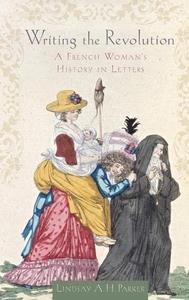
Free Download Writing the Revolution: A French Woman’s History in Letters By Lindsay A.H. Parker
2013 | 224 Pages | ISBN: 019993102X | PDF | 2 MB
Writing the Revolution is a microhistory of a middle-class Parisian woman, Rosalie Jullien, whose nearly 1,000 familiar letters have never before been studied. The Jullien name is not new to histories of the French Revolution. Rosalie’s son, Marc-Antoine, known in the family as Jules, wasclosely connected to the Committee of Public Safety during the Reign of Terror. However, despite being the wife and mother of revolutionary elites, Rosalie led a private life. Connected to the Revolution in very personal ways, she was also distanced from the lime light because of her gender and herproclivity for modesty. Her correspondence allows readers to enter her private world and see the intellectual, emotional, and familial life of a revolutionary in all of its complexity.The prevailing thesis in the field holds that the revolutionary elite constructed the New Regime against women, effectively excluding them from the political sphere, although nearly every existing study of women has approached the subject through oblique sources and mostly male voices. RosalieJullien’s long missives to her husband and son, however, document her relationship to politics as she explained it. Despite never seeking a public role, Rosalie developed a political identity that included a revolutionized understanding of womanhood. Writing the Revolution builds on the innovativescholarship on the history of the family during the Revolution and demonstrates how the family sphere was revolutionized even in cases where the wife maintained a traditional family role.Jullien’s correspondence boasts many values as an artifact of the Revolutionary experience, of women’s lives, and of epistolary culture. Rosalie demonstrates the individual’s experience within the evolving structures of a modernizing state, family, and gender identity. The period covered spans from1775 to 1810. A portrayal of Rosalie’s early married life, and the decade she spent with her husband and children in a small town north of Grenoble, begins the book, and is followed by a chapter on the couple’s reading practices and their views toward religion prior to the Revolution. The heart ofthe research focuses on Rosalie’s life and experiences in Revolutionary Paris and her decision, in the aftermath of the Terror, to emphasize private, domestic life over politics.
Buy Premium From My Links To Get Resumable Support,Max Speed & Support Me
Links are Interchangeable – Single Extraction










Leave a Reply
You must be logged in to post a comment.